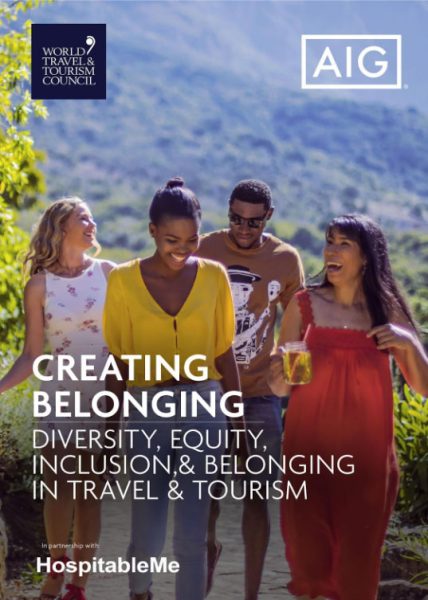KIGALI Rwanda, 6 November 2023: The World Travel & Tourism Council (WTTC) has unveiled its first-ever global Travel & Tourism report focussing on Diversity, Equity, Inclusion and Belonging (DEIB) during its Global Summit hosted in Kigali last week.
The report “Creating Belonging: Diversity, Equity, Inclusion & Belonging in Travel & Tourism” results from a collaboration between WTTC and HospitableMe, a global leader in inclusive hospitality.

Supported by AIG Travel, the report offers data around Travel & Tourism employment, aiming to equip the public and private sectors with the tools they need to spark change and make Travel & Tourism more diverse and inclusive.
Drawing on data from six economies, Rwanda, Australia, the US, UK, South Africa and the EU, it offers a deep dive into metrics such as gender, age, sexual orientation, disability status, and educational skills.
According to the global tourism body, the share of female workers in Travel & Tourism was highest in Australia, at 54%, followed by the US (48%), higher than the overall average.
In terms of youth employment, the sector has always been considered a key employer for those aged under 25 years.
This research shows the US saw 26% of youth employees in the sector, more than twice the share of the total economy average (12%), with Australia (26%) and Rwanda (24%) following closely.
Last year, according to this new study, the UK’s Travel & Tourism sectors employed a higher share of LGBTQ+ employees (5.2%) than the overall economy (4%), with a nearly 2.7 percentage points increase since 2011.
Workers with a disability status made up nearly 17% of the UK’s Travel & Tourism workforce. At the same time, the US sector represented nearly 5%, marginally higher than the overall economy (16.6% and 4.4%, respectively).
WTTC President & CEO Julia Simpson said: “Travel & Tourism has always been a people sector, whatever their background. Hospitality goes beyond travellers; it is about how we welcome and care for our colleagues and employees.
“Our sector has come a long way. Across the board, we are seeing efforts and changes led by major Travel & Tourism businesses, who are now paying more attention to creating a sense of belonging, supporting their employees, regardless of who they are or where they come from.”
Travel & Tourism supports people from all walks of life, employing the highest share of workers with lower levels of formal education across the EU, UK and the US compared to the overall economy.
The report also included a comprehensive survey of WTTC Members, offering a detailed view of the DEIB landscape across the sector, providing best practice examples for areas such as recruitment, education and training, and benefits, amongst others.
WTTC draws from the findings to offer opportunities for the challenges faced by the sector, such as education on DEIB and senior leadership support, recruitment process, and benchmarking and research.
A majority of the companies analysed (60%) had dedicated personnel to their DEIB efforts, making clear this is a pressing topic all Travel & Tourism stakeholders should pay close attention to to ensure the term “hospitality” equals “partnership”.
To access this report, please visit WTTC Research Hub







